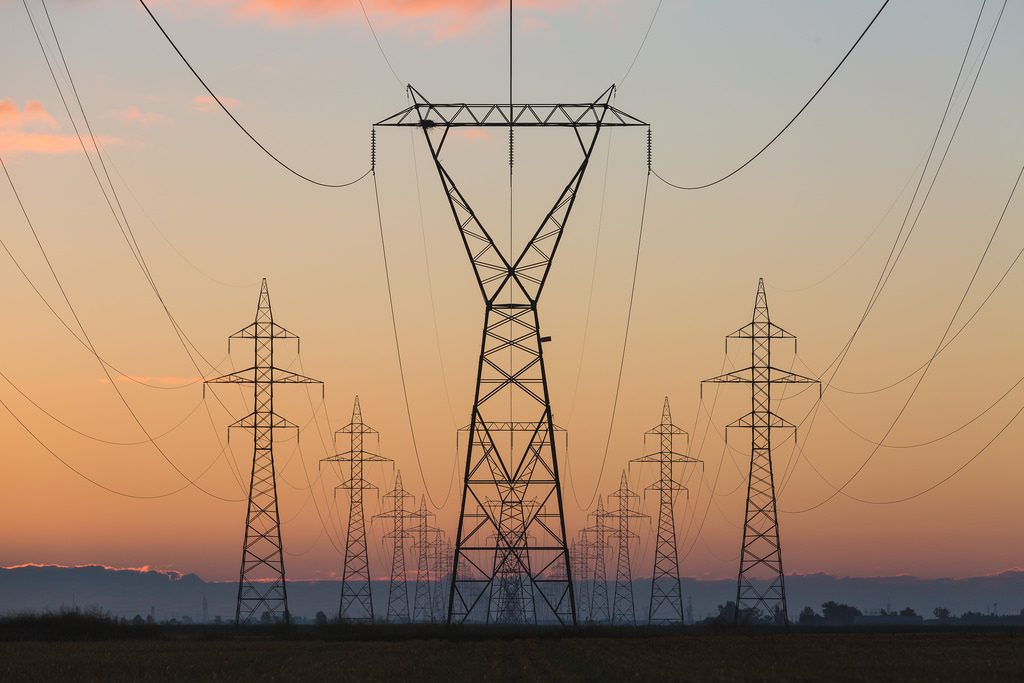Gimme Hands: The Power Of Being Selfish… With Yourself

“Manitoba Powerlines” by Matt Wiebe, CC BY 2.0 license
Selfishness is typically not a trait to be pursued, developed, or cultivated. But when it comes to your financial freedom, all of that conventional moral wisdom goes right out the window.
Now don’t throw the baby out with the bath water – I’m not talking about being selfish when it comes to the way you treat OTHERS. I’m referring only to the importance of cultivating selfishness in your future self when it comes to its dealings with your current self.
If you are still aghast that I would suggest such a thing, it may help for you to think of this concept in the much more palatable light of delayed gratification.
Overcome Your Aversion To Gimme Hands
Back when I was but a young and impressionable tyke, I was indoctrinated with a dangerous moral concept. One which would later threaten my ability to achieve financial freedom as an adult. The concept was that of the importance of sharing. And the dastardly instrument chosen to deliver this lesson was Buzzle Billy.
Buzzle Billy was a happy child with lots of toys and friends. That is, until he didn’t want to share his toys anymore. When Buzzle Billy became greedy, he grew “Gimme Hands” which snatched his toys away from his friends. As a consequence, Buzzle Billy lost all of his friends and became despondent and alone. He eventually learned to share, ridding himself of his Gimme Hands for good and regaining his friends once more.
I’m here to tell you that when it comes to the relationship between you and your future, Buzzle Billy had it all wrong. True long-term happiness with your finances will only come from consciously developing Gimme Hands in your future self.
The Delayed Gratification Endorphin Rush
Skeptical? Then I challenge you to think back to a time when your future self grew Gimme Hands and snatched money away from the current version of yourself. Not sure what I mean? I’m talking about accidental delayed gratification.
Most of us have experienced this at least once before. Ever put on an old pair of jeans or a coat you haven’t worn since last winter and found a $5, $10 or $20 bill in the pocket? Took a trip down memory lane by looking through some aged birthday, anniversary, or Christmas cards and found a long-forgotten gift card enclosed? Popped open your glove compartment and discovered a stash of bills from that long-ago bank withdrawal? If you can answer yes to any of the these questions, then you know the joy of accidental delayed gratification.
Now think back to the moment you discovered that unexpected cash and how it made you feel. Joyful? Ecstatic? Rich? Flush with cash? Extremely generous?
None of these feelings are uncommon. And you have the selfishness of your future self to thank for them. The current version of yourself would have likely found a less rewarding use for that money long ago. But thanks to accidental delayed gratification, you had an unexpected windfall in your hands to do with as you pleased.
The Fleeting Happiness Of Discretionary Spending
Compare and contrast the feeling of ecstasy you feel when you discover an unexpected $20 bill with the happiness that you obtain by buying a vending machine snack per day for a month. They’re typically not on the same level. And for this reason, it’s easy for the current version of yourself to fritter away money without truly gaining any substantial happiness.
To prove the point, which would you rather have – a $1.00 vending machine snack per day for a year, or $269 instead? Five snacks per week for 10 years, or $3,719? This is the difference between the bite-sized chunks of discretionary spending and the much larger sums of delayed gratification.
The current version of yourself might enjoy getting out of your cubicle to eat a $10 lunch on the town every day. But you’ll be far, far happier if you allow the future version of yourself to greedily snatch that money away from you. It’s unlikely that a year’s worth of $10 lunches will bring you the same happiness as would having $2,692 in your pocket at the end of the year. Or that ten year’s worth of lunches would provide the same joy as having $37,190 in your savings account.
Exactly How Powerful Is Delayed Gratification?
Delayed gratification is a wonder of the human psyche and was the subject of a fascinating 1960’s study known as the Stanford Marshmallow Experiment. Aside from its ancillary lifestyle benefits, delayed gratification can result in a truly shocking level of savings.
For example, take your net monthly budget surplus calculated as net profit in the last article. Use the principles reviewed in Your Rocket To Riches to determine how much savings you could accrue with it in a given year, five year, ten year, or even 50 year period.
If invested at historical rates of return, a mere $500 surplus per month has the potential to grow into savings of $6,225 after one year, $35,799 over five years, $86,010 over ten years and more than $2.5 million over a 50-year period.
That’s the power of delayed gratification for you. Retire a millionaire 2.5x over, or prioritize your current lifestyle over that of your future and blow that same $500 per month on cable television, eating out, vending machine snacks, and frivolous material possessions. The choice is yours.
The Power Of Saving Your Monthly Budget Net Profit
In the previous article, we examined how your finances are similar to those of a Fortune 500 company. As the CFO of your household, you have a major decision upcoming on how to allocate the net profit of your monthly budget surplus between savings and discretionary spending.
My intent with this article is simply to make you aware of the savings potential of your existing monthly budget surplus. Many Americans feel trapped and unable to make progress towards their savings goals. But if you couple the power of being intentional with that of delayed gratification, incredible achievements are in fact possible.
Cultivating selfishness in your future self by foregoing discretionary spending today in favor of saving for your tomorrow can power you all the way to financial freedom.
Next Steps
For those of you who have been following the Master Your Money series from the beginning, below are the next steps on your journey to financial freedom:
- If you haven’t already, read Compound Interest, Part 2: Your Rocket To Riches.
- Use your net monthly household budget surplus calculated in the previous article with this compound interest calculator at a 7% rate of return to calculate how much savings you could accrue if you saved all of your net profit every month over the course of one, five, ten, and fifty years.



This post makes me think about what it really means to be selfish. Which is more selfish: instant gratification or delayed gratification? I think it’s the former. If you consume something now, your money is gone forever. If you save it, you have the option later of spending it on yourself, sharing it with others or giving it away. So I would argue that delayed gratification is actually less selfish.
Having said that, delayed gratification CAN be selfish if you hoard wealth and never use it to invest in the things in life that have value and bring joy, whether it’s your family or a cause you believe in. I believe that money leads to selfishness when we hold on tightly just to make our lives more comfortable and secure.
I couldn’t agree more, Dave! Well put. Giving is one of the (many) facets of financial freedom and I submit that it should certainly be one of if not THE underlying motivation. Accruing wealth simply as a means unto itself seems like it would be an unrewarding (not to mention selfish!) exercise.
Financial freedom should be all about becoming free to pursue your passions, talents, calling, and, ultimately, capacity for helping others. I’m a strong believer in the concept of stewardship and that to those whom much is given, much is also expected.
One of the reasons my wife and I desired to become financially independent so strongly was so we could give of not just our finances, but also of our time. I’m striving to become a much better husband, father, son, brother, and neighbor now that my family is no longer in “survival” mode when it comes to time management.
Thanks for stopping by and sharing your thoughts!
Yeah, maybe that money’s gone, but unless you’re incapable of working, you also can likely earn its again or perhaps even more.
Each morning, I ask myself: what can I do today that my future self will be grateful for or enjoy? I live my life according to that philosophy. It also includes taking care of the unpleasant tasks when they crop up, preventive/proactive actions, and other future planning. As a result, I encounter very few sudden or panic-induced moments because almost everything’s been anticipated. Gotta factor in lots of Murphy’s Law here too. When you make this a habit, you also gain leverage for whatever you’re tackling with your proactive/pre-emptive approach. If you maintain your car, home, etc. and replace major items before they break, you’ll never overpay for ’emergency’ services on your plumbing, electrical, HVAC, appliances, etc. You can instead shrug and walk away and shop around because time’s on your side.
This might just be my favorite comment the blog has received to date. What you’ve described is the very epitome of the Financial Freedom Project approach, and the crux of this article!
I’m a dedicated DIY’er, which of course involves lots of intensive research and learning. I usually do my level best to document all of my research and findings pertaining to a given project or skill as I learn it, for sake of future reference. This dedication to documentation has paid off many a time as I have revisited projects or skills and was saved by my prior note-taking.
Maintenance logs describing automotive repair or service procedures I’ve performed on our vehicles are one such example of this. I’ve found myself grateful to my former self many-a-time due to these notes. In these situations, I usually turn to Mrs. FFP and tell her that I just impressed myself… which she, in turn, finds less than impressive 🙂
I couldn’t agree more with the importance to proactive and preventative maintenance. I grew up in a family who dealt with maintenance on an as-broken basis, and learned the frustrations of this approach first hand. I’m a big believer in preventative maintenance for the exact reasons you’ve mentioned – you’re not under the gun. You don’t need to overpay. You can shop and hunt for deals. This approach helps take the stress out of life while saving your wallet at the same time.
The concept of being selfish with yourself can apply to money, time, or stress levels. The key is to always work to benefit your future self. It sounds like you have this down to a science!